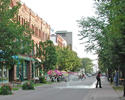Feelings of frustration, exhaustion, and being overwhelmed may be some of the last words Disney “imagineers” – people who are part of the “creative engine that designs and builds all the Walt Disney Company theme parks” – want to hear when guests visit their various theme parks around the world. Sadly, these words describe my recent trip to Orlando and it turns out that many other families regularly feel the same way. read more »
Small Cities
Spontaneity: The Missing Ingredient in Disney Parks
- Login to post comments
The Battle of Oak Grove
“People Come and Go. I Plan for the Land.”
Our initial efforts to save Oak Grove from densification were pretty naïve. First, we thought we could persuade the Clackamas County planners that densification was a bad idea. We invited the lead planner to walk the neighborhood with some of us, a walk that ended with a visit in Jeanne Johnson’s home. read more »
- Login to post comments
The Next Economy: Following the Trail of U.S. Job Growth
A decade ago, in the wake of the Great Recession, Lee County, Florida was dubbed “the foreclosure capital of the country” by the national media, the poster child for all that had gone wrong with the American economy. read more »
- Login to post comments
Make America Affordable Again
The Department of Housing and Urban Development has asked for comments on eliminating regulatory barriers to affordable housing. This is my response. read more »
Be Careful When Citing Jane Jacobs: Her Conclusions Don’t Always Hold
As a professor who teaches about cities and the urban form, I very much appreciate the sidewalk ballets and street-corner societies that have historically existed in our nation’s urban centers. These features of the built-environment have long been powerful factors in the formation of both social capital, community, and a place’s identity. read more »
- Login to post comments
Immigrant Entrepreneurs Drive Main Street's Growth
In cities and towns in all reaches of America, businesses started by immigrants are critical pieces of the fabric of our economy and communities.
My children attend a Montessori preschool started by an Indian immigrant. Like many, she did not come to this country to start a business. But after multiple college degrees in the U.S. and some years working in corporate America, she opened her first Montessori school. Nearly 15 years later, she owns two schools, employs 100 women, and touches the lives of hundreds of students each day. read more »
- Login to post comments
Afterburn
Here in California we’ve just received our first rain since last winter after another brutal round of massive forest fires. Our Mediterranean style climate cycles from a long dry hot period to a few short cool wet winter months. October is our most fire prone time of year. It’s hot, the earth is bone dry, the vegetation is brittle, and windstorms stir up fires like a giant hair dryer. Cyclical burns are part of the ecosystem here and are normal and necessary. read more »
- Login to post comments
It's Organic! End of Conjecture and the Science Ahead
A long succession of urban theorists, including Jane Jacobs, have intuited, implied, or proclaimed the “organic” nature of cities. This organic concept of cities describes them as self-organizing, complex systems that might appear messy, but that disorderliness belies a deep structure governed by fundamentally rule-bound processes. read more »
- Login to post comments
Stop Overlooking the Richness of Rural Life
From questions of upward mobility and opportunity to concerns about access to health care and education, rural America clearly isn’t perfect. read more »
- Login to post comments
Where Salaries Go Furthest in 2019: The Small-City Advantage
Big cities are the engines of the modern economy. They offer workers a range of opportunities — and employers a range of workers, customers, and infrastructure — that smaller places generally can’t match. But when it comes to what many job seekers care about most, smaller cities often are best. In particular, for most jobs, salaries are higher in smaller places after accounting for the cost of living.
read more »
- Login to post comments






















